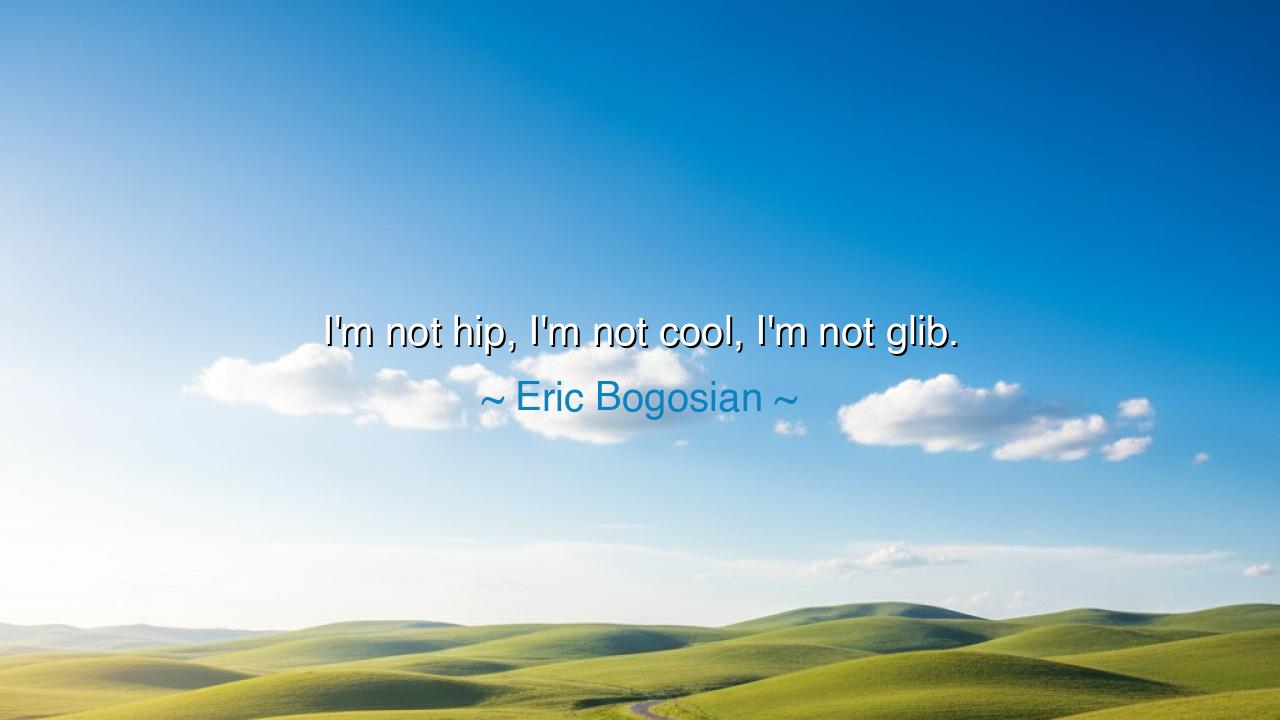
I'm not hip, I'm not cool, I'm not glib.






In the ancient scrolls of wisdom, it is said that "true strength lies not in conforming to the world, but in standing firm in one’s authentic self." Eric Bogosian’s words, "I'm not hip, I'm not cool, I'm not glib," speak with the raw honesty of a soul who has cast aside the illusion of social status in favor of personal truth. In a world that is constantly pushing individuals to fit into predefined molds of coolness and popularity, Bogosian’s declaration is a bold act of self-acceptance. He acknowledges that the external validation we often seek—whether through being hip, cool, or glib—is but a fleeting shadow that, in the end, can never provide the lasting peace that comes from being true to oneself.
In ancient Greece, Socrates spoke often of the value of self-awareness and authenticity. He famously declared, “Know thyself,” for it is only through understanding one’s own soul that we can live with purpose and integrity. To seek the approval of others, Socrates warned, is to live in illusion, for it is only within ourselves that we find the guidance we need to lead a meaningful life. Bogosian’s words resonate with this ancient truth: the pursuit of external coolness is an empty quest, a distraction from the deeper work of understanding and nurturing the true self. The person who is constantly chasing after the fleeting applause of the crowd will, in the end, find themselves adrift in a sea of superficiality.
Consider the life of Diogenes, the famous philosopher of ancient Greece, who was known for his rejection of social norms and his embrace of simplicity. Diogenes lived in a barrel, spoke his mind without concern for others’ opinions, and was unashamed of his refusal to conform. He famously encountered Alexander the Great one day, and when the mighty king offered him anything he wanted, Diogenes simply replied, “Yes, stand out of my sunlight.” Diogenes, like Bogosian, was unconcerned with being hip or cool by the standards of his time. Instead, he embraced his authenticity, knowing that true freedom lay in releasing the shackles of societal expectation and living according to his own principles.
Bogosian’s admission, in its simplicity, is a call for the modern world to embrace the power of authenticity. In an age where social media often distorts the truth, presenting images of perfect lives and carefully curated personas, it is easy to fall into the trap of seeking external validation. The pressures of being popular or attractive in the eyes of others can lead to a life spent chasing illusions, a pursuit that only leads to exhaustion and emptiness. The wisdom of the ancients, however, reminds us that true happiness comes not from fitting in, but from standing out in our own truth. To live without the need for validation is the highest form of freedom.
The story of Leonardo da Vinci, too, serves as a reminder of the power of rejecting superficiality in favor of substance. Da Vinci, a genius in art, science, and invention, was never concerned with being popular in the traditional sense. His focus was on the pursuit of knowledge and creativity, and though his contemporaries may not have always understood or appreciated him, he remained steadfast in his mission. His genius was not in his ability to be hip, but in his willingness to follow his inner calling despite the conventions of his time. His story speaks to the long-lasting impact of authenticity over the transient nature of social approval.
For us, too, the lesson is clear. To truly succeed in life, we must first succeed in being ourselves. Whether it is in our work, our relationships, or our personal goals, the path to true fulfillment lies in the courage to step away from the crowd and follow our own inner voice. We must resist the pressure to conform to society’s standards of coolness and instead cultivate our unique qualities, knowing that in doing so, we will attract the people and opportunities that are meant for us. The lesson is not to shy away from being different, but to celebrate it. Authenticity is the highest form of self-respect, and in embracing it, we find the strength to live with purpose and integrity.
Thus, the wisdom of the ancients and Bogosian’s reflection converge: true greatness is not found in trying to be something we are not, but in having the courage to embrace who we truly are. In a world that often values appearances over substance, we must resist the temptation to chase after shallow approvals and instead turn inward, seeking strength from the genuine self. By doing so, we unlock the door to real fulfillment, a life that is truly our own, free from the constraints of societal expectation.






AAdministratorAdministrator
Welcome, honored guests. Please leave a comment, we will respond soon